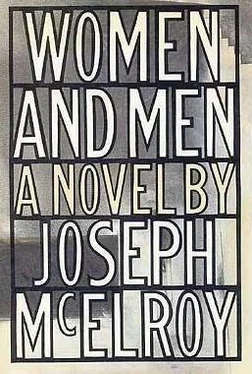"That life leaves death-things?" said the Hermit-Inventor, who, suddenly older and Anglo and insane for a moment, laughed at his amazing visitor who had just walked in off the great table of the American continent. "She is with child," said the young man. "Not to my knowledge," said the Hermit. "You told me she might be," said his visitor. "She is not with child now," said the Hermit. "Life will leave death-things," said the Navajo Prince. And if for some minutes they pursued this other matter of the precipitate air that mattered to both as knowers, the elder knew that the younger was already gone and must wonder if he was armed. Did he happen to know how the spiral interior of those hailstones carried every so often down this corridor from the north to join with the stunning work of that blue snake actually made these whatever-they-were, these rays that came from the mountain? The Navajo Prince, who was an unusual Navajo, removed the black, brown, and gray chunk of old bison in his pocket, and took then from the bottom of his pocket a small lump of red-orange clay-stuff. The red might be from the blood of those hunters who had been caught upon the mountain at the time of a particular hail and been sucked precipitately right out of their own bones into the high slope where a big cat might watch from among the trees. The Hermit did not touch the lump. The Prince squeezed it respectfully in his long fingers and it looked to have a softness of very cool butter. The Hermit did not like it and did not like the bison chunk, which the young man was talking of as a compacted secret that his hand would someday absorb. And then he would go back to his people to help them.
"Don’t wait," said the Hermit, and then, "Where are you going?" for the Prince had politely turned away toward the door. A box kite came up even with the window and there were yells from the street. The Prince looked and must have seen the strange writing on the kite, which disappeared, tugged downward. "The Statue is worth seeing," said the Prince. "It is on my way." "You can see it any time," said the Hermit too casually. The Prince was such a fine young man in his gift boots and overalls and blue shirt. He seemed to say his cells enabled him to be in two places at once, and to be those two places; he spoke as if he must risk being elsewhere. He knew something about that couple who had trekked across the Bering Strait, and had become one, according to the Prince, during a north-wind storm, and this was thousands of years gone by.
When the Indian left to inspect the city, the Hermit followed but at once lost him and went to a small hotel nearby where there was a telephone. Outside the hotel a carriage was leaving for the Hudson River pier with a gentleman and a lady going to Europe, trunks stacked behind, the two of them looking at each other as if they couldn’t wait for the romance of Europe. The Hermit knew the porter at the hotel.
He made a phone call. Margaret’s father did not answer. Margaret did. Her voice made the Hermit’s whole face spread outward as if it had exploded, and he knew he was in love with the girl who so many years before he had jokingly told to go west.
He told her what had happened, where the young man was heading, and what he had said about life leaving death-things and her being with child. Margaret said that she had an idea. She sounded strong. But she asked, then, "How did he seem?"
The Hermit thought of saying nothing. But he replied, "He is in love. He is dangerous. He has found the way to New York. He will find the way to you." The Hermit said he had told her dream to him.
"In ten years," she said through the static of the phone, "I will smile at the memory. I will make sure my daughter understands such things."
"Your daughter?"
"I have none yet, " the young woman said with such life in her tone that the Navajo Prince might have been a dream, no more.
If he could help, would she call on him? She said she thought she knew where the Prince would go. She sounded different, as if telling some story.
In the street again, the Hermit found the Indian waiting for him, as if he had been following the Hermit. "Was she carrying her child with her when you saw her?" asked the Indian. The Hermit could not find the answer. "Is the child dead?" asked the Indian. The Hermit looked at the young Indian’s hands and then his face. "I know where she will be," said the Indian, and turned away.
Suddenly the Hermit said, "She will go to the Statue."
"Why do you say that?" said the Indian, but did not wait to be answered.
He had waited long enough.
Boxed in and watched by even the future she felt; hating all of us in her, but calm and so determined — she felt him in her very eyes, how she saw maple trees here in Windrow that he in fact had never seen, how she saw faces she had told him of; and she loved him and was sick of him and could have killed him if he would kill her. And wanted no bad thing to happen to Alexander, who had waited a long time for her but because he had chosen to, and who was so kind she had kissed him once on the mouth, and it was different and friendly, and there was a slight smell of tobacco and she wondered if Alexander had had any experience. He told her the family place in the cemetery looked good as new and she smiled at the phrase and lived a horror of it fixed somewhere beneath the skin of her smile, which Alexander told her sweetly was the light of his life.
Why did you go down to that woman’s apartment and buzz and walk right away before she had a chance to come to the door? I mean, did you know she wasn’t home? I mean Grace Kimball.
I heard people in there, and I knew I didn’t want to ask her anything after all.
About that old lady and the meteorologist you—
Yeah. That’s ended. It’s repetitious.
Isn’t that what your friend Ted said history was?
Like cancer cells. Like memory cells.
But why is history repetitious?
Take the Middle East.
It’s a hot potato, Jimmy.
Ted said he was pretty sure he would die before the world did. But he had an idea how it would end.
So your dream decided you about us. And that’s getting back to the subject.
So he walked miles and inspected the City from farmyards down to the Battery which had been a place of guns once. And he took a boat and thought the Statue threatening the more he looked. He could not stop the boat taking him to the island. He could not stay on the boat when it docked. He did not go in the Statue. He watched from a grassy lawn, with the harbor breeze turning him ever and anon to look at the great cluster of buildings on the Manhattan Island far off.
He knew he would go inside the body of the Statue which was made of metal and he smelled its cold, dead smell where he sat upon a stone walk, but he did not know when he would go on in, because the afternoon was getting on, and he knew the time would come when he would know what to do.
He was half-hidden from the Statue behind a large piece of stone that had been shaped; so he did not see from the harbor side a new boat approaching until it passed, and then he watched it dock, and his eyes hurt but he saw Margaret’s face shadowed by a large straw hat, was he asleep? and she had on a long white dress, and when she got off the boat and the sun brought the wind on she was with another woman. He thought he had been asleep, so cold had the afternoon become. She looked around her and spoke to a lady who was not with her, and went with a group round out of sight, and the Prince thought he had been asleep and dreaming, because he had known she would come and that that would be the moment to go into the Statue. He looked keenly toward the group, who were far away from him, but she was not with a man, there was no young man with her.
Читать дальше












